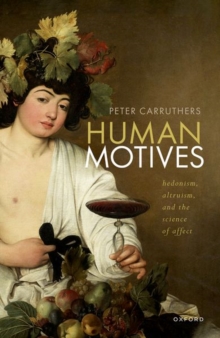Description
| Product ID: | 9780198906131 |
| Product Form: | Hardback |
| Country of Manufacture: | GB |
| Title: | Human Motives |
| Subtitle: | Hedonism, Altruism, and the Science of Affect |
| Authors: | Author: Peter Carruthers |
| Page Count: | 240 |
| Subjects: | Philosophy of mind, Philosophy of mind, Ethics and moral philosophy, Psychology, Ethics & moral philosophy, Psychology |
| Description: | Human Motives shows how the sciences of decision and affect support a form motivational hedonism (the theory that everything we do is done in pursuit of pleasure and to avoid pain and displeasure) while making room for both genuine altruism and intrinsic motives of duty. Motivational hedonism (often called “psychological hedonism”) claims that everything we do is done in pursuit of pleasure (in the widest sense) and to avoid pain and displeasure (again, in the widest sense). Although perennially attractive, many philosophers and experimental psychologists have claimed to refute it. Human Motives shows how decision-science and the recent science of affect can be used to construct a form of motivational hedonism that evades all previous critiques. On this view, we take decisions by anticipating and responding affectively to the alternatives, with the pleasure / displeasure component of affect constituting the common currency of decision-making. But we do not have to believe that the alternatives will bring us pleasure or displeasure in the future. Rather, those feelings get bound into and become parts of the future-directed representation of the options, rendering the latter attractive or repulsive. Much then depends on what pleasure and displeasure really are. If they are intrinsically good or bad properties of experience, for example, then motivational hedonism results. Carruthers argues, in contrast, that the best account is a representational one: pleasure represents its object (nonconceptually, in a perception-like manner) as good, and displeasure represents it (nonconceptually) as bad. The result is pluralism about human motivation, making room for both genuine altruism and intrinsic motives of duty. Clearly written and deeply scientifically informed, Human Motives has implications for many areas of philosophy and cognitive science, and will be of interest to anyone wanting to understand the foundations of human motivation. |
| Imprint Name: | Oxford University Press |
| Publisher Name: | Oxford University Press |
| Country of Publication: | GB |
| Publishing Date: | 2024-01-26 |
